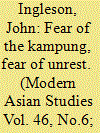| Srl | Item |
| 1 |
ID:
115289


|
|
|
|
|
| Publication |
2012.
|
| Summary/Abstract |
This paper discusses the responses of The Netherlands Indies colonial government to the rise in urban unemployment in Java brought about by the 1930s Depression. At least one in six of the large European/Eurasian population in the colony, and an even larger proportion of urban Indonesian workers, became unemployed as a result of the Depression. The colonial government and the European community were greatly concerned that the growth of unemployment among Europeans would lead to destitution for many, ultimately forcing them into the native kampung1. They were also concerned about what they saw as the moral decay of local-born European/Eurasian youth who were unemployed in unprecedented numbers. Furthermore, the European community feared that the growth in unemployment among western-educated Indonesians in the towns and cities in Java would create a fertile recruitment ground for nationalist political parties leading to urban unrest. Fear of the kampung for destitute Europeans, and fear of urban unrest from unemployed western-educated Indonesians, shaped the colonial government's responses to urban unemployment. The impact of the Depression on both Indonesian and European unemployed in the towns and cities in Java triggered lengthy debates on the role of the state in the provision of social security.
|
|
|
|
|
|
|
|
|
|
|
|
|
|
|
|
| 2 |
ID:
190145


|
|
|
|
|
| Summary/Abstract |
Interpreted as ‘unity in diversity’, Indonesia's national politicians appropriated the slogan Bhinneka Tunggal Ika from a fourteenth century poem to legitimise one nation-state for the diverse archipelago. As Indonesia becomes a rapidly urbanising country, the concepts of ‘unity’ and ‘diversity’ intertwine with changing landscapes and societies. With the growth of cities as centres of population and economic activities, the intensity of development in the city has transformed urban spaces, social interactions, economies and aspirations. Much of these urban transformations have affected urban kampung, early forms of urban settlement. Urban kampung has a historical role in the making of ‘unity in diversity’ as a national concept, but official discourses rarely associate kampung with the slogan, even when concerns on tolerance and diversity increase in urbanising Indonesia. Using urban kampung as a viewpoint in city- and nation-building, we conduct archival and ethnographic research to interpret everyday practices of Bhinneka Tunggal Ika. To what extent does the slogan play a role in the social construction of city neighbourhoods? How do everyday realities in an urban kampung relate to the national slogan? As kampung remains relatively autonomous but also stigmatised in the city, taking kampung as a viewpoint allows insights into city- and nation-building knowledge that integrate everyday practice and conceptualization of the city and the nation.
|
|
|
|
|
|
|
|
|
|
|
|
|
|
|
|